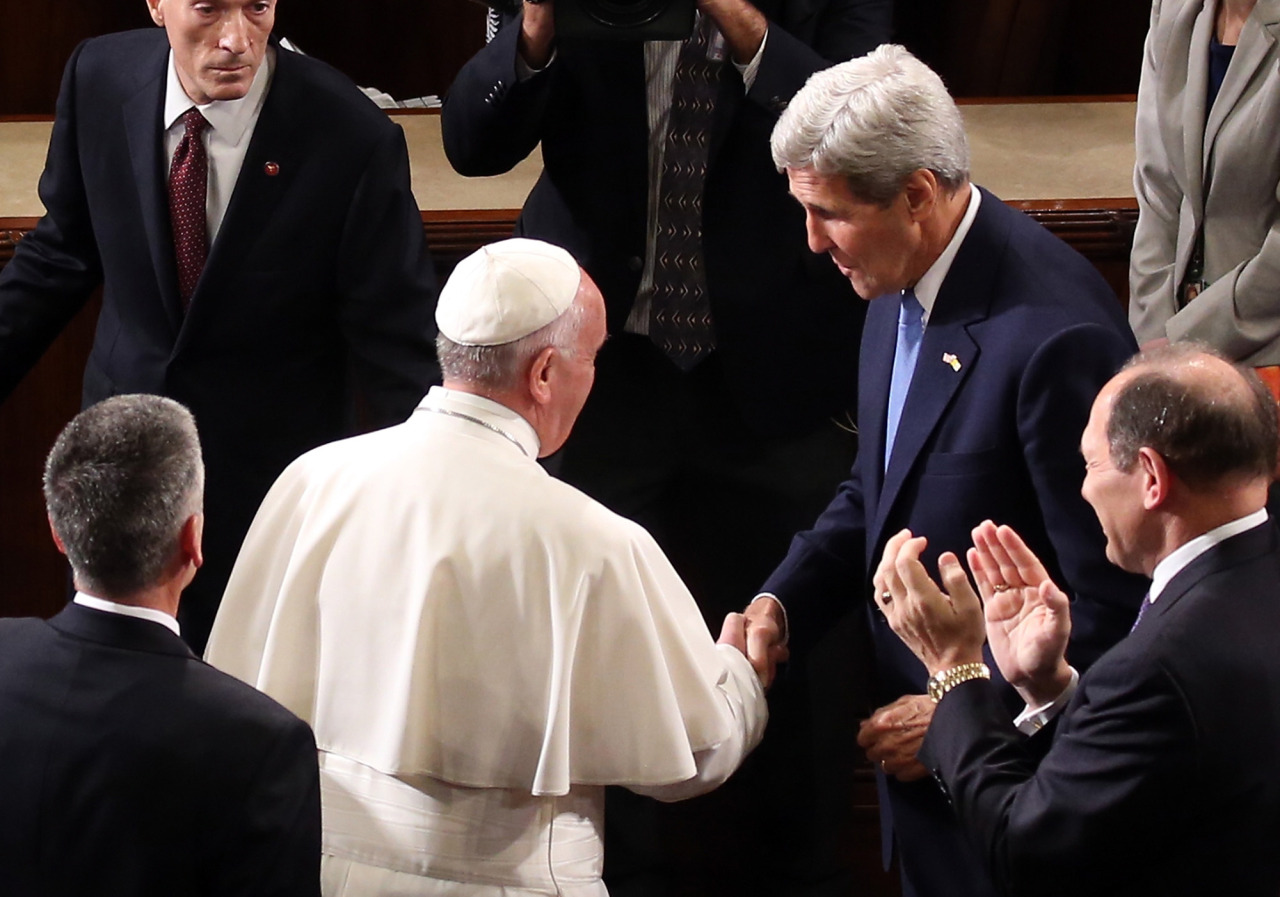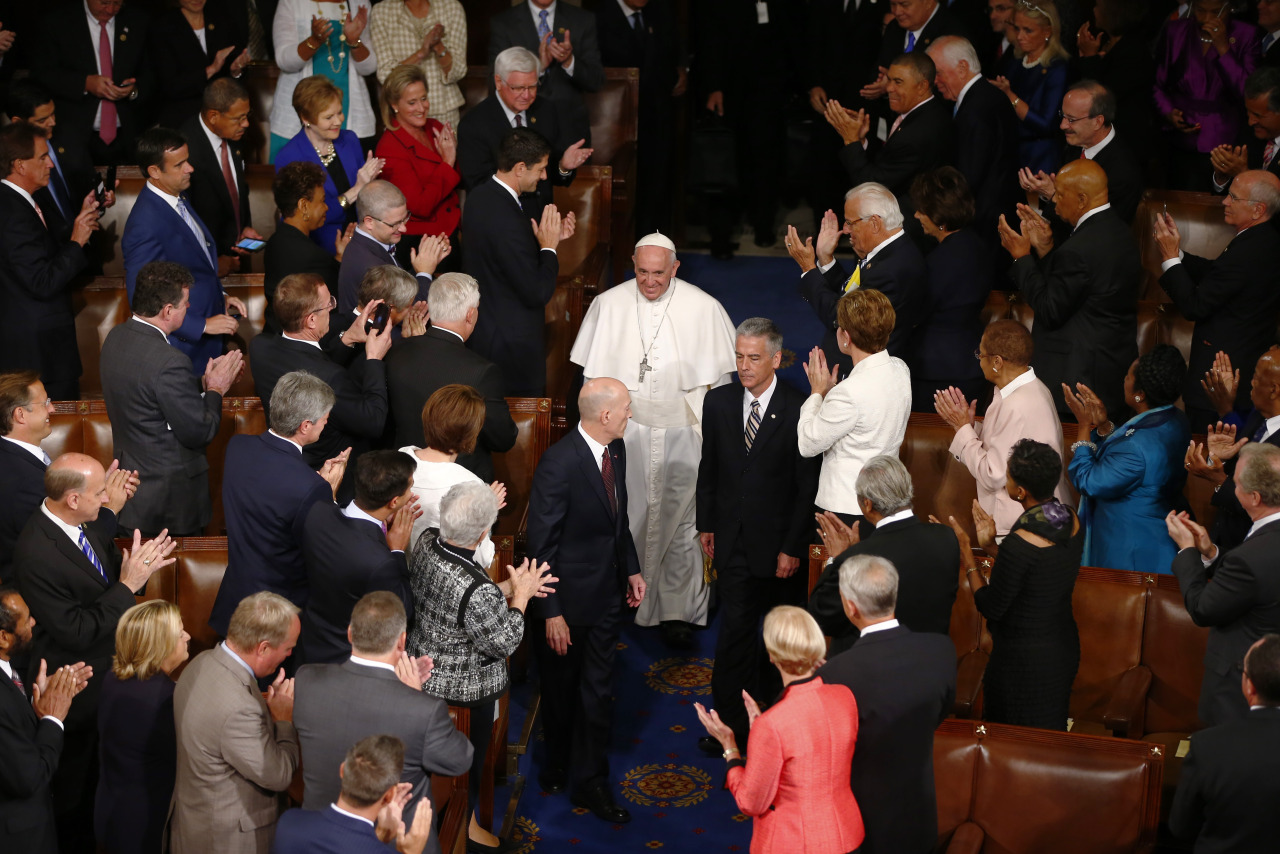September 25, 2015

Pope Francis is greeted by Secretary of State John Kerry and other members of Congress at the Capitol on Thursday. (Photo: Mark Wilson/Getty Images)
Attendees of Pope Francis’ speech to Congress on Thursday morning had been drilled on the proper protocol to observe. This was not a State of the Union address, which normally begins and ends with glad-handing. There was to be no hugging of the pope. No sticking out hands to shake. Absolutely no selfies.
And so as the pope entered the House chamber, he was able to make his way down the aisle quickly, with small nods here and smiles at the members of Congress who stood applauding and trying as hard as Catholic schoolchildren to be good. As Francis reached the front of the room, however, he turned and approached a startled Secretary of State John Kerry with his hand extended. The two exchanged brief words, and the pontiff continued to his place behind the podium.
That single handshake speaks volumes about how Pope Francis has impacted American Catholicism.
When Kerry ran for president in 2004, he was the first Catholic nominee since John F. Kennedy more than 40 years earlier. Far from needing to prove that he would not take orders from the Vatican, Kerry was dogged by criticism from conservative Catholic leaders over his support for abortion rights. Then-Archbishop Raymond Burke declared that Kerry should be denied the Eucharist, and the candidate’s campaign ended up adding a communion check to its advance work, calling ahead on the trail to confirm that the church where Kerry would attend Mass on a given week would allow him to receive communion.

Although surveys sent to both the Kerry and Bush campaigns determined that the Democratic nominee held more positions in common with the U.S. Conference of Catholic Bishops, his Republican opponents were able to capitalize on the perception that opposite was true. Martin Gillespie, who headed Catholic outreach for the Republican National Committee that year, recalled later how exercised conservative Catholics were about “Kerry passing himself as Catholic.”
The attacks on Kerry’s Catholicism worked. The 2004 election was decided in Ohio, where Kerry lost the Catholic vote by a margin of 44 to 55. If he had just matched Al Gore’s showing among Ohio Catholics in 2000, Kerry would have won the state — and the presidency.
It’s not hard to imagine that as Kerry shook the pope’s hand on Thursday, his mind flashed to how different that election might have been if Francis had occupied the Chair of Saint Peter then.
***
Pope Francis’ historic address to Congress — the first delivered by a leader of the Roman Catholic Church and the Holy See — was a call to action, delivered with gentle firmness and leaving no question about the breadth of Catholic concerns, as he sees them. Ranging from climate change to immigration, from capital punishment to poverty, the pope hit on issue after issue that continues to divide American politics.
He did not pretend that addressing these challenges would be easy. But, Francis told members of Congress, it is their job. “You are called to defend and preserve the dignity of your fellow citizens in the tireless and demanding pursuit of the common good, for this is the chief aim of all politics.”
Over the course of nearly an hour, the pope returned a half dozen times to the idea of the “common good,” a theme Kerry hit often as well in his presidential campaign. But while Francis did not hesitate to condemn practices that he sees as destructive — evocatively describing the arms trade as existing “simply for money; money that is drenched in blood” — he referred to abortion only in passing. That doesn’t mean he believes the issue is unimportant; the pope has already spoken directly about abortion on his U.S. tour and will undoubtedly do so again before departing. His speech on Thursday, however, seemed to be an intentional hitting of the reset button for American Catholicism.
If that decision strikes some observers as evidence that this pope is a liberal, it is because for the past few decades, the American Catholic hierarchy has delivered the clear message that those Catholics who support abortion rights — and even those who support a pro-life platform that goes beyond abortion to include support for immigration and ending the death penalty — pose a threat to the faith. Starting in the late 1980s, church leaders have regularly threatened and punished individual Catholic Democrats because of their politics.

Pope Francis is applauded as he arrives to give a speech to Congress on Thursday. (Photo: Tony Gentile/Reuters)
In 1990, the bishop of Trenton declared that pro-choice politicians were prohibited from speaking at church-sponsored events. New York Cardinal John O’Connor wrote in diocesan newspapers that these same politicians “must be warned that they are at risk of excommunication.” One New York bishop went further, informing then-Gov. Mario Cuomo that he was “in danger of going to hell if he dies tonight.”
A few years later, during the 1996 U.S. Senate race in Louisiana, the retired archbishop of New Orleans told voters that a vote for the Democratic candidate Mary Landrieu (a pro-choice Catholic) would be considered a sin. The spiritual consequences of support for abortion rights were made clear in 1998 when the U.S. Conference of Catholic Bishops released a major document called Living the Gospel of Life. The bishops urged pro-choice Catholic politicians “to consider the consequences for their own spiritual well-being.”
Even Joe Biden, who is never shy to defend himself and his faith, has come under attack. In 2006, then-Wilmington Bishop Michael Saltarelli persuaded Biden’s high school alma mater to forgo plans to name a new student center after him. The day after Barack Obama selected Biden as his running mate in 2008, Archbishop Charles Chaput — who will host Pope Francis in Philadelphia later this week — said that Biden “should refrain from presenting himself for communion.”
Biden is more willing than most of his colleagues to fight back, memorably declaring in 2005 that “the next Republican that tells me I’m not religious, I’m going to shove my rosary down their throat.” But decades of having their faith questioned or being dismissed as “cafeteria Catholics” while their Republican colleagues go untouched has taken a toll on Catholic Democrats in public life.
Years after a contentious conversation with her archbishop in Connecticut, Democratic Rep. Rosa DeLauro’s eyes still welled up when she recalled what he said to her: “Let me be perfectly clear. You, Kennedy, Dodd, Moynihan — you are not welcome in the Church.”
***
Compare those words with Pope Francis’ admonition to his brother bishops at St. Matthew’s Cathedral on Wednesday: “Harsh and divisive language does not befit the tongue of a pastor, it has no place in his heart; although it may momentarily seem to win the day, only the enduring allure of goodness and love remains truly convincing.”

Pope Francis’ visit to the U.S. may not end up changing the tone in Washington — it didn’t take long for some politicians to criticize parts of his speech, with Sen. Ted Cruz, R-Texas, arguing that the use of capital punishment is a “recognition of the preciousness of human life.” But the more important audience for his words and actions may be the leaders of the U.S. church.
Changing that climate will take time. Not long after Pope Francis spoke to the U.S. bishops on Wednesday, John Kerry tweeted that he was grateful for the pope’s remarks earlier that day on climate change, diplomacy, and “protect[ing] the vulnerable.” Less than an hour later, the bishops’ conference account send him a pointed tweet: “Agree, John. @Pontifex reassures all of us that Catholic teachings have always treasured human life from its very beginning.”
- #popeinus
- #washingtondc
- https://popevisit2015.yahoo.com/post/129840607664/pope-singles-out-kerry-ending-a-divisive-era-for




No comments:
Post a Comment